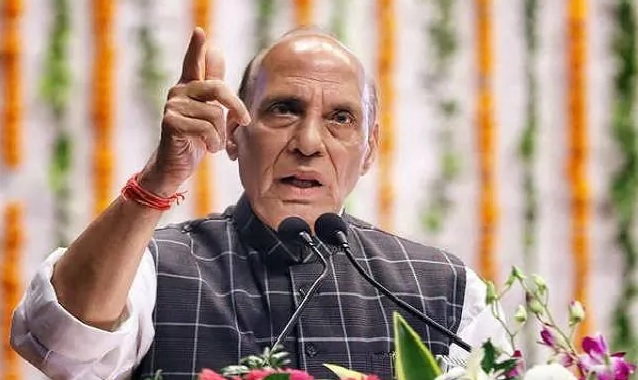By appointing Pakistan—a state long accused of nurturing, sheltering, and glorifying terrorism—as the Vice-Chair of its Counter-Terrorism Committee, the United Nations has once again shown why its credibility is in tatters. India’s Defence Minister Rajnath Singh, never known to mince words, rightfully called out this grotesque contradiction for what it is: “Asking a cat to guard the milk.”
His indignation was not a rhetorical flourish. It was the voice of a responsible nation watching the global security order being mocked in broad daylight. The very country that gave sanctuary to Osama bin Laden—the architect of 9/11—and continues to harbor UN-designated terrorists like Hafiz Saeed and Masood Azhar has now been given a seat at the table to dictate how the world should fight terror. This is not just absurd. It is dangerous.
Rajnath Singh exposed the hypocrisy with facts: Pakistani military officials attending funerals of slain terrorists; its soil consistently used to train, equip, and dispatch jihadist proxies into India; and foreign aid being funneled into terror infrastructures. “Pakistan is not just a victim of terrorism; it is the father of terrorism,” he said—and rightly so.
But the rot runs deeper than just one decision. The United Nations, envisioned as the moral compass of the post-war global order, has in recent decades become a bystander, often complicit in some of the worst human tragedies. Its record is stained with inaction: Rwanda (1994), Srebrenica (1995), Darfur (2003), Syria (2011–), Myanmar (2016), Ukraine (2022), and Gaza (2024). Each crisis exposed the same dysfunction—a toothless, politicized body unable to act when it mattered most.
The current crisis of credibility stems from the outdated, oligarchic structure of the UN Security Council, whose five permanent members (P5) wield veto power like a weapon to protect their geopolitical interests, even if it comes at the cost of justice, peace, or human rights. Locked in the Cold War-era dynamics of 1945, the UNSC is structurally incapable of reflecting the complex, multipolar world of the 21st century. Power today is diffused across regions, yet the global decision-making apparatus remains in the hands of a few.
This is not just a theoretical or procedural flaw. It has real-world consequences: when the world’s premier body for peace and security shields state sponsors of terror instead of isolating them, it sends a chilling message—that international law is optional, that morality is negotiable, and that terror can be whitewashed by political expediency.

The UN stands at a precipice. Either it reforms, or it slides into complete irrelevance. The call for transformation is not new, but it has never been more urgent. Countries like India, with a population of 1.4 billion and a record of democratic governance, economic strength, and global responsibility, are kept out of the Security Council’s permanent circle. Meanwhile, rogue states like Pakistan manipulate the system to wash their crimes in blue helmets.
The world order is rapidly shifting. The United States under Donald Trump is no longer interested in underwriting global security. Instead, it’s retreating into an isolationist shell, reshaping itself as a regional rather than global power. China and Russia, meanwhile, are expanding their spheres of influence, redrawing borders—literal and ideological—without any regard for global consensus. The result? A fragmented, unstable world where might is right, and institutions like the UN are seen as mere relics.

In such a volatile environment, the UN must either rise to meet the challenges of a multipolar, ideologically fractured world or be replaced by new, leaner coalitions that do not indulge in moral compromise. India, along with likeminded nations, must lead this charge towards a new architecture of global governance rooted in truth, justice, and action, not platitudes and politics.
Rajnath Singh’s anger, then, is not just an outburst—it is a moral warning. “Terrorists are not freedom fighters. No religious, political, or ideological motive can justify terrorism,” he said. These words must ring in the ears of UN diplomats who think neutrality means silence, and inclusion means appeasement. If Pakistan cannot root out terrorists from its territory, Singh added, “it should seek help from India.” His reference to Operation Sindoor—India’s largest-ever counter-terror mission—was not mere chest-thumping. It was a declaration that India will act decisively, with or without UN approval, to secure its people and borders.
The message is loud and clear: India will not let the global order be dictated by double standards, nor will it remain silent when terror is mainstreamed under the guise of diplomacy. If the UN continues down this path of selective morality, it risks becoming not a beacon of hope but a co-conspirator in humanity’s descent into chaos.
Let this serve as a wake-up call for the United Nations and for the world.





